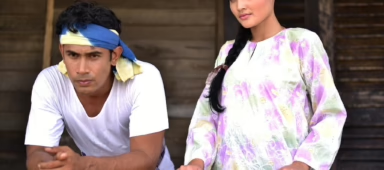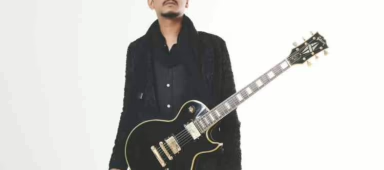British High Commissioner to Malaysia Her Excellency Victoria Treadall did not plan for a career in the foreign service
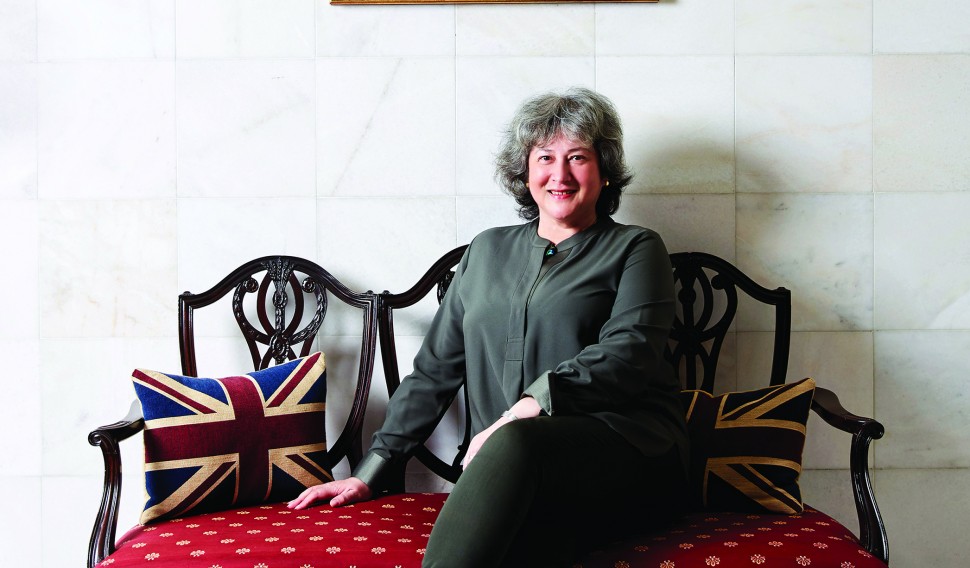
Born in Malaysia, Vicki, as she is fondly known, received her early education at Tarcisian Convent in Ipoh. She talks to us about her early childhood spent with a large family and coming back as a diplomat, not once, but twice, since leaving Malaysia at the age of eight.
What about your childhood that was most memorable?
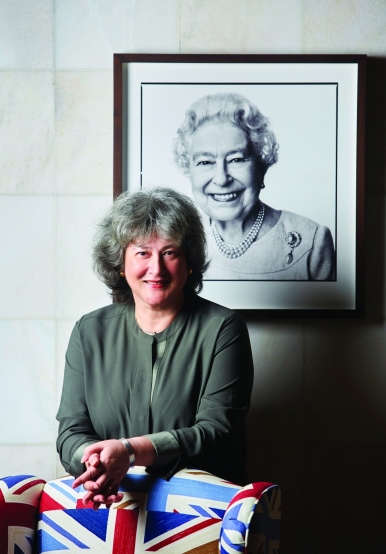
I think it was being part of a very large family, a very typical Malaysian family. My mother, in particular, was one of nine (siblings), so I had lots of aunties and uncles who had lots of children, so huge gangs of cousins. With the aunties taking turns at weekends and having the nephews and nieces over, my childhood memories were very much filled with the fun and games of being with cousins. Food, of course, was a dominating factor, like all Malaysian households, particularly around Chinese New Year, but also during other festivals and when my grandfather, gung-gung, was still alive, we would go and visit. I also remember going to school as a typical Malaysian child with my blue pinafore dress, white shirt and white canvas pumps. Going to school with my friends from all the races, and I think back then, in the late 60s just being friends with everybody, going to each other’s houses with the different festivals, whether it was Diwali or Hari Raya. It was very much a multi-cultural environment that I grew up in. Those are the memories of my childhood.
You spent nine years here as a child and went to a local school for two years; do you speak any Bahasa Malaysia?
I learnt Bahasa at school and some of my parents’ staff spoke Bahasa but it was an English medium education then. Like a lot of children in Malaysia, you grow up trilingual. We spoke English because that’s what my father spoke. When I was with my mother’s family, we would speak in Cantonese and of course, Bahasa was something you picked up and also learnt at school. I often say I left Malaysia when I was eight, so I have the vocabulary of an eight-year-old.
How many times have you been back prior to 2014?
I came back a couple of times for family holidays when I was a teenager. One year, in particular, was my grandfather’s 80th birthday and 80 years is a very significant age if you’re Chinese. So that was one occasion when we came back. Then as a young junior diplomat, I was here on my first assignment to the British High Commission and that was between 1986 and 1990.
Malaysia, then and now, must have been a world of difference.
Yes, there’s a lot of visible change in the economic development of Malaysia. You just have to look at the infrastructure. If I go back to my childhood or even when I was here in the late 80s, early 90s, KLCC was a race course. The twin towers at KLCC as we see it today did not exist. The whole city centre transformation, the highways that we have now in Malaysia have shortened the drive time between KL and Ipoh, for example, when it would have taken at least four to five hours to drive before the new highways were built. In that sense, I have seen a lot of development, a lot of economic transformation. The Malaysian economy has gone through diversification and is not so dependent on commodities. This is something your government is focused on, including the whole new digital economic agenda.
I’ve seen the change in other things as well. For example, English is no longer the medium of education and so, vernacular schools are flourishing, which I think one can understand but at the same time, one of the things that Malaysia has lost, which we need to find a way to put it back, is that generations of young people have not grown up together, have not gone to school together. Socialising amongst Malaysians happens in a different way. It’s wonderful that we still have the tradition of open houses but in some sense – maybe its nostalgia – open house was every weekend across all your friends. You didn’t wait for festivals to go to the homes of other races. Now, it’s only three to four times a year.
How would you describe relations between Great Britain and Malaysia in 2014 and now?
I would contrast it to when I was first here in 1986 at the height of “Buy British Last”. It was not the best period of our history, and I contrast it to returning all these years later when the relationship is as strong as it has ever been. There has been a renewal in our relationship. That is something that I and my team have been working very much on and if I use the example of “Buy British Last” in the 80s, today, walk into any shopping mall in Malaysia, you will find British stores whether it’s Marks and Spencer or perhaps less obvious, but every Guardian Pharmacy is owned by Britain’s Jardines. That tells a story of how since that low ebb in our relationship, we have rebuilt it and gone from strength to strength. Now, it’s not just about Malaysian students going to the U.K. to pursue their studies, but British institutions are investing in Malaysia. We have five British university campuses here. Nottingham was the first one, and we have over 30 British international schools. So British academic institutions are investing in Malaysia and in many respects, helping Malaysia realise its own ambitions of becoming an education destination in this part of the world.
You obviously had a clear idea of what you wanted to achieve when you were appointed High Commissioner to Malaysia. What were some of these ideas?
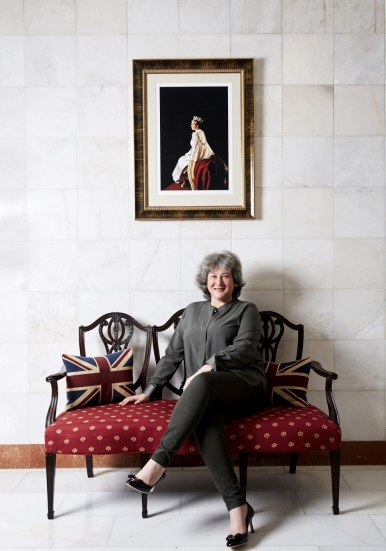
The first priority was to make sure that we built on a renewed and strengthened relationship. A key moment before my time in 2012, when our then-Prime Minister David Cameron came to Malaysia, he and (Malaysian) Prime Minister Najib established a very good relationship, so my starting position was a strong one. We then saw in 2015 Prime Minister Cameron come back to Malaysia to show that commitment and good relationship at the highest political level, so what we’ve been focusing on is on increasing our trade and investment relationship, building on what we have achieved before but working even more closely with your Ministry of International Trade and Industry to look at the sectors where Britain has particular strength and Malaysia has particular opportunities. But it’s not just about what we sell to each other or what we invest in each other but how we can collaborate. One of the things I’m proud that I’ve achieved with my team is building this concept of partnerships. If I take the digital economy, which is a priority for the Malaysian government, as an example, in 2016, I signed, on behalf of the British government, an MoU with MDEC (Malaysia Digital Economy Corporation) that we would work very closely together to scope out opportunities for our and Malaysia’s digital sector. We have seen three delegations to the U.K. to look at our technology and innovation offer, and last October, we had the largest ever tech mission – some 45 British companies and organisations coming to Malaysia to look at partnerships, joint ventures and investments in Malaysia.
Come October, you would have been here for four years, and typically, each posting is for a four-year period. Any idea yet where you’ll be going next?
You focus on a four-year plan always knowing that you will be moving on, but the point is what you hand over to your successor, so that the successor takes over the baton and then runs their own race to make sure that we build on what we have achieved. You asked me the question what else am I proud of achieving, apart from this new (MDEC) partnership and collaborative model, I think education has been a huge strength and pillar of our bilateral relationship. There is something like 500,000 Malaysian alumni of British universities today in Malaysia. We have maintained Malaysian student interest in going to Britain such that Malaysian students account for the second largest foreign student body in the U.K. – some 18,000 Malaysians are studying in the U.K. This is second only to China and way ahead of India and other countries, and that’s part of the people-to-people ties that we have, the comfort and the familiarity with each other.
This is why so many Malaysians get on Malaysia Airlines to fly to the U.K. all the time, whether for business or pleasure. Some Malaysians just go back to do the same thing every year, for the shopping, the theatre, the wonderful heritage that we have, the natural beauty and landscape of the Lake District and Peak District, all of that and of course, some 400,000-450,000 British tourists come here a year. It’s one of the big destinations in Southeast Asia for British tourists. This is something that we want to preserve.
Coming back to education, we are working to make sure we’re not complacent, that the British offer remains the preferred offer for Malaysians. Because it is globally competitive, people can choose other countries, but we want them to continue to choose Britain. My team and I have been working on promoting the modern and contemporary relevance of Britain because although we have a history and the people-to-people relationship, why should Britain matter to Malaysians today? So apart from education, our trade and investment, the other big issue that we can work on is partnerships with Malaysia. If we look at defence and security, what very few people know about is something we call the Five Powers Defence Agreement (FPDA), which is where Britain, Australia and New Zealand are working with Singapore and Malaysia to guarantee the defence of Singapore and Malaysia. We have some British armed services personnel alongside Australia, New Zealand, Singapore and Malaysia at the HQ for the FPDA in Butterworth (in Penang, Malaysia). Every year, we practise between our armed services so that if the call ever came to defend Malaysia, we know what our operating procedures are. Equally on cyber security, we all have a shared concern about the threat of extremisms and how that might tip over to terrorism. Thank God, Malaysia has never experienced the kind of terrorist attacks we have seen in Britain, but there are people – when you restrict their space in other geographies – who might be looking for new areas to perpetrate that kind of thing. So, homeland security is another important piece of work that we have been doing with Malaysia.
You’ve been in the Foreign and Commonwealth Office for 40 years now. That’s a long time. You must really enjoy what you do.
When I joined the foreign office, I was only intending to work for about six months, save as much money as I could and then go off to travel before going to university, but then I thought I could have a life of travel if I applied myself to this career. For example, from KL, there are so many wonderful places to get to, not just in Malaysia but beyond. When I think about my time in India, to be able to explore that country, or on the other side of the world in New Zealand, being able to go and visit parts of South Pacific that you would not ordinarily get to. Even my first posting overseas to Pakistan, to be able to go to the remote areas – now because of security issues are impossible to go to – with the most amazing scenery that is largely untouched and undeveloped, those experiences of being able to travel because of where I am sent are just such a privilege.
What do you enjoy doing in your spare time?
I have such a busy work life that if I have a quiet weekend or an evening to myself, it’s important to spend it with my husband, who sees very little of me during the work week, so catching up with my husband, catching up with each other’s news, talking about current events, reading books and comparing notes. They’re really quite quiet and peaceful pastimes.
I hear you’re into gastronomy?
Yes, I like to cook. I find cooking therapeutic and calming, and the results are usually edible. This is the other thing I like doing during my free time.
What do you cook?
My home cooking is more rustic, simple dishes. I cook all variety of food but obviously, I cook Asian food, not least because of my own Asian heritage, and so curries, stir-fry, and like everyone else, we cook pasta as a quick and easy dish. Every now and then, I do the full-blown English roast dinner because you must do that!
Any favourite dish?
I couldn’t say I have a favourite. If I was to boil it down to two types of food I tend to eat most, I would say Indian and Chinese. Even when I was in London last week, the two meals I had out were in Indian restaurants!
There have been some negative reactions in the U.K. to the marriage of HRH Prince Harry to Meghan Markle. What is your opinion on that? Isn’t it proof of how far Britain has come on race?
There are some old-fashioned perceptions of Britain, (while) the marriage of His Royal Highness Prince Harry and Meghan Markle actually reflect what modern Britain is all about. In ordinary society in Britain, mixed race marriages are not unusual, not unacceptable, so Britain has come a very long way since then. Those who might comment in a negative way do not actually reflect the majority view in our country. Whatever people read, Britain is a very open, pluralist society, where people have all the freedoms of a democracy, of self-expression in all its forms, to the extent that even our media write all sorts of things that in some countries if they were written about the Prime Minister or the government, they would find unacceptable. We can’t say we believe in a free press but then we clamp down on what the press says. Having the right laws – there is responsibility with freedom of expression – that as long as it does not incite hatred, whether religious, racial or whatever, then there should be tolerance in the society to allow for a diversity of opinion. Coming back to your point, I think the fact that we are seeing this royal marriage is a cause for celebration and pride for a country for whom this is just completely acceptable and normal, and as I often point out to journalists, when I joined the British Foreign Service 40 years ago, there were not very many people who were different, never mind gender. I remember joining as an 18-year-old, and looking at the ladder above me, there were no female ambassadors or very many senior women. It was a very white Anglo-Saxon hierarchy. Yet someone like myself – born in Malaysia, Eurasian, family moved to Britain – that I can return to Malaysia as the British High Commissioner tells you what Britain is all about – a country that has no difficulty with this.


